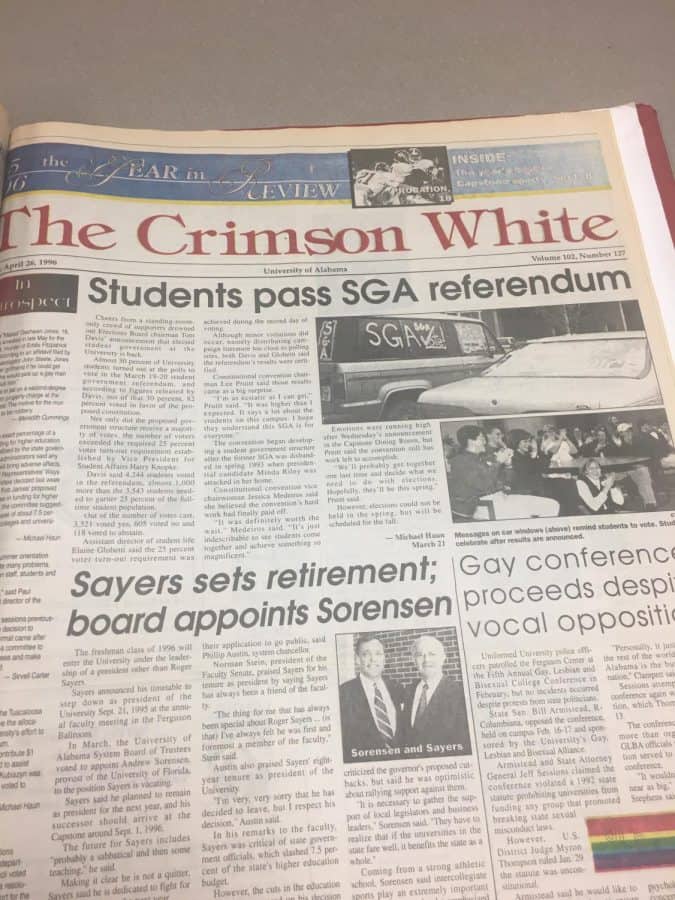Making history: Archives show 2020 is the least contested campaign season in 70 years
March 2, 2020
When we heard that the SGA presidential seat was going uncontested this year, the first thing we asked was, “Has that happened before?”
Spoiler alert: It has. But, with a full slate of unopposed executive candidates, and only two colleges with competing Senate candidates, this SGA candidacy tops the charts as the most uncontested in a very, very long time.
Full disclosure – while the Student Government Association has been around for 106 years, our newsroom’s archives don’t begin until 1949. But in the past 70 years, no other campaign season has seen less competition than this one.
1954: Jim Wright
In 1954, most executive positions, including that of the SGA president, went uncontested, with the three major positions being granted to white males from Alabama. Jim Wright, from Tuscaloosa, ran in the unopposed race for president.
Senate hopefuls faced more of a challenge, though. In the race for seats in the legislature, 51 candidates were approved by the student court for 28 positions.
“Bamians looking forward to contested elections this year won’t be disappointed after all,” a CW article read. “Although the top positions have only one candidate seeking each position, the elections of the legislators promise to be one of much campaigning.”
1965: Zach Higgs
A decade later, the SGA found itself in a similar situation when the only major SGA candidate to run against opposition was the vice president. The uncontested president was Zach Higgs.
The vice presidents running were John Daniel, who billed himself as “the only qualified candidate,” and Allen Lee, who asked voters to “make the logical choice,” according to a 1965 CW article. Only four out of eight schools had any competition during the race for senators.
The SGA’s structure looked different in the ‘60s. Some notable positions included a “married students seat” and gendered races for dormitories. Each college also supported executive-level candidates, such as secretary-treasurers.
1992: Mark Bain
The SGA did not have an uncontested presidential candidate until nearly 30 years later.
A CW article noted that Mark Bain, the sole candidate, admitted he was backed by the Machine.
“The Delta Chi fraternity member, who said he is endorsed by the Machine, is the only student who has officially entered the race for the top office in the SGA,” the article stated.
Notably, some students campaigned for write-in candidates after seeing the uncontested slate.
“I’m not talking rhetoric – I am talking action,” Eric Rimbert said in an article announcing his write-in candidacy. “It’s time for the students.”
Rimbert, who made it his goal to tackle racism on campus, said he entered the race for president “so that the Student Government Association can be the SGA rather than the club of select people.”
“I’m not going to be the voice for each student,” he said. “I can’t be that. What I want to be is more like the microphone, so the students can speak through me.”
Rimbert followed the lead of Frank Thomas, the first student to take on Bain as a write-in. Shortly afterward, Rick Danielson, another student, followed their lead.
“I’ve seen how SGA works and how the politics on this campus works,” Danielson said. “Sometimes I think politics on this campus can be seen as a joke.”
The trio ultimately lost to Bain, who won with about 2,000 votes.
1998: Bill Hankins
From 1993 to 1995, the SGA shut down in the wake of harassment and assault allegations. In 1995, legislation was ratified to bring back the SGA, and non-Machine candidates were backed by coalitions that had formed during the shutdown.
But democracy didn’t last long. Just three years after the shutdown, Bill Hankins ran uncontested for SGA president, garnering only about 2,000 votes. While one write-in candidate managed to eclipse an incumbent in the race for vice president for academic affairs, two write-ups in a March 19, 1998, edition of The Crimson White charged that this election suffered the “lowest voter participation yet.”
As with most presidential elections, however, candidates are not the only thing that is being voted on.
“Apathy in voting breeds apathy in office,” the CW Editorial Board wrote, lamenting the constitutional amendments that had passed on ballots marked by less than one-fourth of the student body. “And if you think at any point the officers do not deserve to be there or the senate is precariously similar to Rome before it fell, remember that you once had a choice.”
2013: Jimmy Taylor
In 2013, Jimmy Taylor ran uncontested for SGA president. According to editorials from the following year, Taylor’s tenure was unsuccessful.
A CW article stated that as the sole candidate for SGA president, Taylor has been using his campaign to build relationships with student groups on campus.
“I want them to know that I’m not just there to campaign,” Taylor said in the article. “I want them to know who I am. I want them to know that I’m the best candidate even though there is not another candidate.”
An editorial in the next year’s edition, however, argued that Taylor didn’t live up to his promise.
“Taylor has followed wildly successful SGA administrations,” the Editorial Board wrote. “… This year, however, the SGA has been ineffective and ghostly.”
Shea Stripling, a 2012 SGA presidential candidate who ran a satirical campaign against her opponent, wrote a letter to the editor that year, joking that “the biggest reason I lost the 2012 election was because other candidates chose to run against me.”
“Jimmy Taylor will be our new SGA president, and he will assume the position with as little effort as one might wish to use when assuming said position,” she wrote. “He, along with the other five unopposed executive candidates, will not be forced to engage in a debate with other candidates, answer difficult questions from concerned voters or pretend the Machine has no control over election results.”
2020: Demarcus Joiner
In each historically uncontested race, Machine influence was suspected, if not outright admitted. In his interview with the CW’s Editorial Board, however, SGA presidential candidate Demarcus Joiner denied any ties to the organization. At a public forum, he acknowledged the SGA’s ugly “past,” and noted that the lack of opposition was “bittersweet.”
“As you may notice, I am the only candidate running for this position, and I must say it is bittersweet,” he told a crowd on Sunday night. “Although I would love to have students actively engaged in the SGA elections, I also feel blessed to know that the student body has a qualified candidate running to become the next SGA president.”








